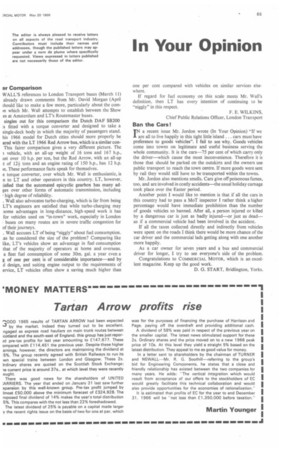In Your Opinion
Page 67

If you've noticed an error in this article please click here to report it so we can fix it.
er Comparison WALL'S references to London Transport buses (March 11) already drawn comments from Mr. David Morgan (April ;hould like to make a few more, particularly about the coma.) which Mr. Wall attempts to establish between the Show es at Amsterdam and LT's Routemaster buses.
singles out for this comparison the Dutch DAF SB200 is fitted with a torque converter and designed to take a single-deck body in which the majority of passengers stand. his 1966 model for Dutch cities should more properly be ared with the LT 1966 Red Arrow bus, which is a similar conThis fairer comparison gives a very different picture. The vehicle, with an all-up weight of 16 tons and 167 h.p., ast over 10 h.p. per ton, but the Red Arrow, with an all-up it of 12t tons and an engine rating of 150 h.p., has 12 h.p. In. These performance facts speak for themselves.
e torque converter, over which Mr. Wall is enthusiastic, is n to LT and other operators in this country. LT, however, tisfied that the automated epicyclic gearbox has many adges over other forms of automatic transmission, including r high degree of reliability.
. Wall also advocates turbo-charging, which is far from being LT's engineers are satisfied that while turbo-charging may some advantages in long-distance, high-speed work it has for vehicles used on "in-town" work, especially in London buses on many routes are in severe traffic congestion for of their journeys.
. Wall accuses LT of being "niggly" about fuel consumption. as he considered the size of the problem? Comparing like like, LT's vehicles show an advantage in fuel consumption that of the majority of operators at home and overseas. a fleet fuel consumption of some 30m. gal. a year even a g of one per cent is of considerable importance—and by 11 design, and suiting engine output to the requirements of ervice, LT vehicles often show a saving much higher than one per cent compared with vehicles on similar services elsewhere.
If regard for fuel economy on this scale meets Mr. Wall's definition, then LT has every intention of continuing to be "niggly" in this respect.
F. E. WILKINS.
Chief Public Relations Officer, London Transport Ban the Cars!
TN a recent issue Mr. Jordon wrote (In Your Opinion) "If we I are all to live happily in this tight little island .. . cars must have preference to goods vehicles". I fail to see why. Goods vehicles come into towns on legitimate and useful business serving the whole community. It is the cars-75 per cent of which carry only the driver—which cause the most inconvenience. Therefore it is those that should be parked on the outskirts and the owners use public transport to reach the town centre. If more goods were sent by rail they would still have to be transported within the towns.
Mr. Jordon also mentions smells. Cars give off poisonous fumes, too, and are involved in costly accidents—the usual holiday carnage took place over the Easter period.
Another point I would like to mention is that if all the cars in this country had to pass a MoT inspector I rather think a higher percentage would have immediate prohibition than the number of goods vehicles so banned. After all, a person injured or killed by a dangerous car is just as badly injured—or just as dead as if a commercial vehicle had been involved in the accident.
If all the taxes collected directly and indirectly from vehicles were spent on the roads I think there would be more chance of the car driver and the commercial lads getting along with one another more happily.
As a car owner for seven years and a bus and commercial driver for longer, I try to see everyone's side of the problem.
Congratulations to COMMERCIAL MOTOR, which is an excellent magazine. Keep up the good work.
D. G. START, Bridlington, Yorks.




























































































































